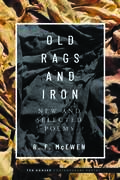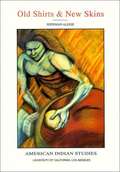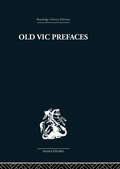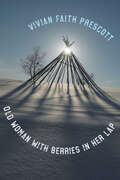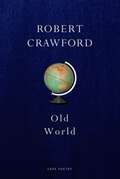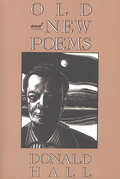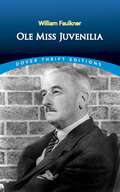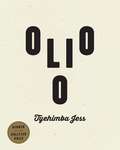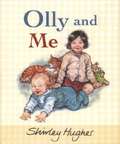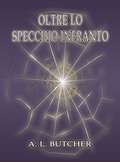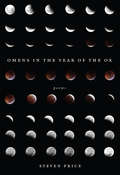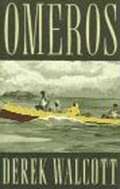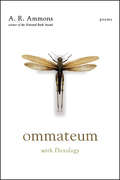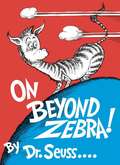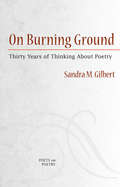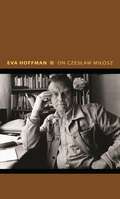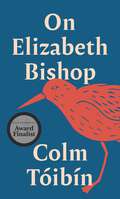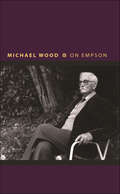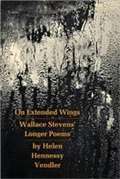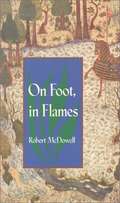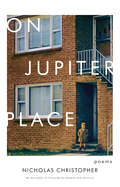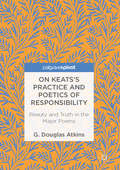- Table View
- List View
Old Rags and Iron: New and Selected Poems (Ted Kooser Contemporary Poetry)
by R. F. McEwenOld Rags and Iron is a collection of narrative poems about the life experiences of working-class people with whom the author, R. F. McEwen, is not only acquainted but whose lives he has shared. McEwen supplemented his income as a teacher while working as a professional logger and tree trimmer, and he writes with great love and respect for blue-collar families. Set primarily in the back-of-the-yard neighborhood of South Side Chicago, where McEwen grew up, as well as Pine Ridge, South Dakota, western Nebraska, Ireland, and elsewhere, the poems celebrate many voices and stories. Utilizing tree-trimming as a central metaphor, these poems of blank verse fictions reverberate like truth.
Old Shirts and New Skins
by Sherman AlexieSherman Alexie's poetic power renders an honest and painful perception of contemporary Native American life. In this collection, Alexie, a poet of the Coeur d'Alene people, speaks for the spirit of Native American resistance.
Old Vic Prefaces: Shakespeare and the Producer
by Hugh HuntOld Vic Prefaces is a collection of the author's talks to the actors on those plays which he produced, while a Director of the Old Vic from 1949 to 1953. The prefaces are unique in that they relate to actual performances, and each preface is followed by a short post-script in which the producer draws attention to some point that arose in production or in rehearsal, which illustrates the sort of problems that confront the producer of a Shakespeare play.
Old Woman with Berries in Her Lap (The Alaska Literary Series)
by Vivian Faith PrescottThrough a single descendant’s voice that speaks to the Sámi diaspora, this collection of poems is a journey through colonialism, transgenerational trauma, and identity. Many have heard of the Sámi reindeer herders brought to Alaska by Sheldon Jackson in the 1800s, but not much is known about the Sámi diaspora experiences in the state and beyond. The poems in Old Woman with Berries in Her Lap use the North Sámi language as well as graphics and various types of poetry to tell these stories of migration and diaspora. Vivian Faith Prescott’s use of language is both a celebration of the richness of the Sámi languages and a mourning of the loss of language that occurs when a population is displaced and forced to exist in a totally foreign language space. According to Sámilinguist, professor, and politician Ole Henrik Magga, the Sámi languages have “very easily . . . one thousand lexemes with connections to snow, ice, freezing, and melting.” These lexemes frame many of Prescott’s poems, introducing ideas and feelings around the loss of language and culture. A compelling insight into the Sámi culture from a contemporary poet’s eye, Old Woman with Berries in Her Lap juxtaposes past and present in an act of reclamation.
Old World
by Robert CrawfordTraversing the globe, Old World is a generous, playful collection about the issues facing our planet today, from a major Scots poet and biographer of T.S. Eliot'For intellectual range, emotional depth, and lexical shimmer, Crawford is unsurpassed' Sunday HeraldMixing lyricism, play, and vulnerability, Old World explores the issues facing our planet in the twenty-first century, from European war to climate change and AI. From riddles and haikus to verse influenced by both Western and Eastern cultures, Crawford arrives at a sense of sacredness of life on earth.These poems speak both of the menaced plenitude of living beings, and of frailties associated with growing old. Part of the book is given over to voices of creatures from the non-human world, part to human voices, but boundaries between these categories become mischievously and disconcertingly unstable.‘A poet of great importance… fluent, inventive, funny, crackling with intellectual energy, and at the very heart of our own time’ Scotsman'In his hands, all modern life can be poetry’ Herald
Old and New Poems: Donald Hall
by Donald HallThis collection drawn from more than forty years of the poet’s work is “a superb introduction to newcomers and a sumptuous offering to familiars” (Publishers Weekly).Former US Poet Laureate Donald Hall has been celebrated with numerous awards, including the National Book Critics Circle Award and the National Medal of the Arts.This volume collects some of Hall’s finest short poetry written between 1947 and 1990. Here are poems of landscape and love, of dedication and prophecy.“Our delight is in following an exceptional poet's growth and depth as he emerges with a richly playful but consummately serious voice.” —Publishers Weekly
Ole Miss Juvenilia (Dover Thrift Editions)
by William FaulknerFaulkner's prolific publication history began at the age of 16 with poems and sketches for the Ole Miss campus newspaper, The Mississippian. The author continued to contribute to the publication throughout his student days at the university as well as after dropping out. These early works of poetry and prose reflect his gift for keen observations and the growing refinement of his voice as one of the greatest of America's Southern authors. Eighteen of Faulkner's elegant pen-and-ink drawings provide an atmospheric complement to the selections. An Introduction by noted Faulkner scholar Carvel Collins is also included.Mississippi native William Faulkner (1897–1962) made his reputation with such psychologically intense and technically innovative novels as The Sound and the Fury, As I Lay Dying, and Light in August, and he received the 1949 Nobel Prize for Literature in addition to two Pulitzer Prizes. Faulkner is especially noted for the rich literary landscape he created in the fictional setting of Yoknapatawpha County, from which he drew characters, places, and themes that reappeared throughout his fiction.
Olio
by Tyehimba JessWinner of the 2017 Pulitzer Prize in Poetry <p><p> Winner of the 2017 Anisfield-Wolf Book Award in Poetry <p> Winner of the 2017 Book Award from the Society of Midland Authors for Poetry <p> 2016 National Book Critics Circle Award finalist for poetry <p> 2017 PEN/Jean Stein Book Award finalist <p> 2017 Kingsley Tufts Poetry Award finalist <p> Named a top poetry book of spring 2016 by Library Journal <p> Part fact, part fiction, Tyehimba Jess's much anticipated second book weaves sonnet, song, and narrative to examine the lives of mostly unrecorded African American performers directly before and after the Civil War up to World War I. Olio is an effort to understand how they met, resisted, complicated, co-opted, and sometimes defeated attempts to minstrelize them.
Olly and Me
by Shirley HughesWith typically charming realism, Shirley Hughes illustrates a special sibling bond that small children will find reassuringly familiar. A visit to the library, making pancakes with Dad, slooshing with water in the yard -- in this collection of poems and anecdotes, a young girl named Katie tells of her family and friends and the everyday moments that make up her world. Most especially, there is Olly, her little brother, who does many things with Katie and, to her chagrin, even tries to join in when she's doing ballet.
Oltre lo Specchio Infranto: Una raccolta di Poesia Oscura.
by A. L. ButcherUna collezione di poesia oscura sulla guerra, l'avvento del cancro e i capricci della vita.
Omens in the Year of the Ox
by Steven PriceSteven Price’s second collection is part of a long-lived struggle to address the mysteries that both surround and inhabit us. The book draws together moments both contemporary and historical, ranging from Herodotus to Augustine of Hippo, from a North American childhood to Greek mythology; indeed, the collection is threaded with interjections from a Greek-style chorus of clever-minded, mischievous beings—half-ghost, half-muse—whose commentaries tormentingly egg the writer on. In poems that range from free verse to prose to formal constructions, Price addresses the moral lack in the human heart and the labour of living with such a heart. Yet the Hopkins-like, sonorous beauty of the language reveals “grace and the idea of grace everywhere, in spite of what we do.” The pleasures of Price’s musicality permeate confrontation with even the darkest of human moments; the poems thus surreptitiously remind us that to confront our own darkness is one of the divine acts of which humans are capable.
Omeros
by Derek WalcottA poem in 7 books, of circular narrative design. Omeros is the Greek name for Homer, invoked here by a Greek girl in exile in America, the invocation marking the beginning of a long journey home, through an intricate web of places, histories and associations, for the poem's characters. Achille and Philoctete are simple fishermen, but they and their tribulations take on the specific gravity and resonance of their mythic Greek counterparts.
Ommateum: With Doxology: Poems
by A. R. Ammons“Oracular, almost biblical at times, and as deeply embedded in the particulars of nature as the superb later poetry.”—John Ashbery This reissue of A. R. Ammons’s debut, published five decades ago in a rare edition, with its penetrating “Whitmanian chants . . . holds in it the mystery of his gradual development into a major American poet, who will be read by the most discerning until the last syllable of recorded time” (Harold Bloom).
On Beyond Zebra!
by Dr SeussChildren learn a list of make-believe words that prove the alphabet doesn't end at Z in a poem format.
On Burning Ground: Thirty Years of Thinking About Poetry (Poets On Poetry)
by Sandra GilbertThe highly esteemed literary critic and poet Sandra M. Gilbert is best known for her feminist literary collaborations with Susan Gubar, with whom she coauthored The Madwoman in the Attic: The Woman Writer and the Nineteenth-Century Literary Imagination, as well as the three-volume No Man's Land: The Place of the Woman Writer in the Twentieth Century. The essays assembled in On Burning Ground display Gilbert's astonishing range and explore poetics, personal identity, feminism, and modern and contemporary literature. Among the pieces gathered here are essays on D. H. Lawrence, Robert Lowell, Sylvia Plath, and Louise Glü ck, as well as reviews and previously unpublished articles. Sandra M. Gilbert is Distinguished Professor of English Emerita at the University of California, Davis. She is the recipient of Guggenheim, Rockefeller, NEH, and Soros Foundation fellowships and is the author of seven collections of poetry, including Kissing the Bread: New and Selected Poems 1969-1999 and, most recently, Belongings. Praise for Sandra M.Gilbert "Sandra Gilbert's poems are beautifully situated at the intersection of craft and feeling. Belongings is a stellar collection by a virtuoso with heart." ---Billy Collins ". . . brilliantly combines literary and cultural criticism with the intimacy of memoir." ---Joyce Carol Oates "An enduring contribution to the literature of grief." ---New York Times Book Review Poets on Poetry collects critical works by contemporary poets, gathering together the articles, interviews, and book reviews by which they have articulated the poetics of a new generation.
On Czeslaw Milosz: Visions from the Other Europe (Writers on Writers #14)
by Eva HoffmanA compelling personal introduction to the life and work of Nobel Prize–winning writer Czesław Miłosz from his fellow Polish exile and acclaimed writer Eva HoffmanCzesław Miłosz (1911–2004) was a giant of twentieth-century literature, not least because he lived through and wrote about many of the most extreme events of that extreme century, from the world wars and the Holocaust to the Cold War. Over a seven-decade career, he produced an important body of poetry, fiction, and nonfiction, including classics such as The Captive Mind, a reflection on the hypnotic power of ideology, and Native Realm, a memoir. In this book, Eva Hoffman, like Miłosz a Polish-born writer who immigrated to the West, presents an eloquent personal portrait of the life and work of her illustrious fellow exile.Miłosz experienced the horrors of World War II in Warsaw—the very epicenter of the inferno—and witnessed the unfolding of the Holocaust from up close. After the war, he lived as a permanent exile—from Poland, communism, and mainstream American culture. Hoffman explores how exile, historical disasters, and Miłosz’s origins in Eastern Europe shaped his vision, and she occasionally compares her own postwar trajectory with Miłosz’s to show how the question of “the Other Europe” is still with us today. She also examines his later turn to the poetry of memory and loss, driven by the need to remember and honor his many friends and others killed in the Holocaust.Combining incisive personal and critical insights, On Czesław Miłosz captures the essence of the life and work of a great poet and writer.
On Earth and in Hell
by Thomas Bernhard Peter WaughThe first English translation of the earliest poetry of brilliant and disruptive Austrian writer Thomas Bernhard, widely considered one of the most innovative and original authors of the twentieth century and often associated with fellow mavericks Beckett, Kafka and Dostoevsky. A master of language, whose body of work was described in a New York Times book review as "the most significant literary achievement since World War II," Bernhard's ON EARTH AND IN HELL offers a distilled perspective on the essence of his artistry and his theme of death as the only reality. A remarkable achievement by highly-respected translator Peter Waugh.
On Elizabeth Bishop (Writers on Writers)
by Colm TóibínA compelling portrait of a beloved poet from one of today's most acclaimed novelistsIn this book, novelist Colm Tóibín offers a deeply personal introduction to the work and life of one of his most important literary influences—the American poet Elizabeth Bishop. Ranging across her poetry, prose, letters, and biography, Tóibín creates a vivid picture of Bishop while also revealing how her work has helped shape his sensibility as a novelist and how her experiences of loss and exile resonate with his own. What emerges is a compelling double portrait that will intrigue readers interested in both Bishop and Tóibín.For Tóibín, the secret of Bishop's emotional power is in what she leaves unsaid. Exploring Bishop&’s famous attention to detail, Tóibín describes how Bishop is able to convey great emotion indirectly, through precise descriptions of particular settings, objects, and events. He examines how Bishop&’s attachment to the Nova Scotia of her childhood, despite her later life in Key West and Brazil, is related to her early loss of her parents—and how this connection finds echoes in Tóibín&’s life as an Irish writer who has lived in Barcelona, New York, and elsewhere.Beautifully written and skillfully blending biography, literary appreciation, and descriptions of Tóibín&’s travels to Bishop&’s Nova Scotia, Key West, and Brazil, On Elizabeth Bishop provides a fresh and memorable look at a beloved poet even as it gives us a window into the mind of one of today&’s most acclaimed novelists.
On Empson (Writers on Writers)
by Michael WoodFrom one of today's most distinguished critics, a beautifully written exploration of one of the twentieth century's most important literary criticsAre literary critics writers? As Michael Wood says, "Not all critics are writers—perhaps most of them are not—and some of them are better when they don't try to be." The British critic and poet William Empson (1906–84), one of the most important and influential critics of the twentieth century, was an exception—a critic who was not only a writer but also a great one. In this brief book, Wood, himself one of the most gifted writers among contemporary critics, explores Empson as a writer, a distinguished poet whose criticism is a brilliant literary performance—and proof that the act of reading can be an unforgettable adventure.Drawing out the singularity and strength of Empson's writing, including its unfailing wit, Wood traces the connections between Empson's poetry and criticism from his first and best-known critical works, Seven Types of Ambiguity and Some Versions of Pastoral, to later books such as Milton's God and The Structure of Complex Words. Wood shows why this pioneer of close reading was both more and less than the inventor of New Criticism—more because he was the greatest English critic since Coleridge, and didn't belong to any school; and less because he had severe differences with many contemporary critics, especially those who dismissed the importance of an author's intentions.Beautifully written and rich with insight, On Empson is an elegant introduction to a unique writer for whom literature was a nonstop form of living.
On Extended Wings: Wallace Stevens' Longer Poems
by Helen H. VendlerThough Wallace Stevens' shorter poems are perhaps his best known, his longer poems, Helen Hennessy Vendler suggests in this book, deserve equal fame and equal consideration. Stevens' central theme-the worth of the imagination-remained with him all his life, and Mrs. Vendler therefore proposes that his development as a poet can best be seen, not in description-which must be repetitive-of the abstract bases of his work, but rather in a view of his changing styles. The author presents here a chronological account of fourteen longer poems that span a thirty-year period, showing, through Stevens' experiments in genre, diction, syntax, voice, imagery, and meter, the inventive variety of Stevens' work in long forms, and providing at the same time a coherent reading of these difficult poems. She concludes, "Stevens was engaged in constant experimentation all his life in an attempt to find the appropriate vehicle for his expansive consciousness; he found it in his later long poems, which surpass in value the rest of his work. "
On Foot, in Flames
by Robert McdowellWorking in the narrative tradition of Robinson, Frost, and Jeffers, Robert McDowell is a leading figure in the expansive poetry movement. His narrative poems deliver the depth and complexity of a novel with a cinematic swiftness. They are accessible, graceful, spiritual without pretension, inhabited by characters tethered to the world.
On Haiku
by Hiroaki SatoEverything you want to know about haiku written by one of the foremost experts in the field and the “finest translator of contemporary Japanese poetry into American English” (Gary Snyder) Who doesn’t love haiku? It is not only America’s most popular cultural import from Japan but also our most popular poetic form: instantly recognizable, more mobile than a sonnet, loved for its simplicity and compression, as well as its ease of composition. Haiku is an ancient literary form seemingly made for the Twittersphere—Jack Kerouac and Langston Hughes wrote them, Ezra Pound and the Imagists were inspired by them, Hallmark’s made millions off them, first-grade students across the country still learn to write them. But what really is a haiku? Where does the form originate? Who were the original Japanese poets who wrote them? And how has their work been translated into English over the years? The haiku form comes down to us today as a cliché: a three-line poem of 5-7-5 syllables. And yet its story is actually much more colorful and multifaceted. And of course to write a good one can be as difficult as writing a Homeric epic—or it can materialize in an instant of epic inspiration. In On Haiku, Hiroaki Sato explores the many styles and genres of haiku on both sides of the Pacific, from the classical haiku of Basho, Issa, and Zen monks, to modern haiku about swimsuits and atomic bombs, to the haiku of famous American writers such as J. D. Salinger and Allen Ginsburg. As if conversing over beers in your favorite pub, Sato explains everything you wanted to know about the haiku in this endearing and pleasurable book, destined to be a classic in the field.
On High (Hugh MacLennan Poetry Series #43)
by Neil SurkanAll songs have skin, / all skin has holes. On High, Neil Surkan's debut collection of poetry, searches for spirits in myriad places. Wondering how, why, and when to act with a conscience, speakers try out steep hikes, strong drugs, and earnest meditations as they attempt to make meaning in a divided and distracting world. Careful and tense, On High balances on all kinds of tightrope-like lines: a trout fisher revels after riding a moose, a buzzed lover speculates about human connection, new condo owners toast from balcony to balcony, a young woman kicks a hornet's nest into her hometown library's erotica/poetry/religion section. Reaching for the sprigs of our shared humanity, Surkan's poems offer courage and compassion in violent times. As the speaker in "The Branch Breaker" muses, "sarcasm won't dissolve our enemies." On High is a book for the contemporary moment.
On Jupiter Place: New Poems
by Nicholas ChristopherBest known as a novelist, Nicholas Christopher began publishing poems in The New Yorker in his twenties, and has published eight collections, praised over the years by poets and critics as being among America's most important poets. Reviewing his selected poems, Crossing the Equator, published eight years ago, The Washington Post said, "To read his richly honed and sensuous work, which has so much tensile strength, is to visit other worlds and then to return to our own disturbed by time, but also refreshed and reawakened."On Jupiter Place is his first book since that collection, and it contains material that is perhaps his most personal, autobiographical and intimate work yet. Beautifully made and carefully constructed, one might be reminded of Keats thinking that his poems were "little machines" of feeling. And everywhere in this book are moments of disorientation, where the wonder of the poem transcends understanding and leads its readers back into themselves slightly startled and richer for the effort. As Merwin has written, "his poems are vibrant with light and the surprise of recognition. He shows us again and again the luminous nature of the familiar."The Washington Post, reviewing his Crossing the Equator: New & Selected Poems, reported that "Nicholas Christopher is a fabulist...His fiction often puts me in mind of Jorge Luis Borges and Italo Calvino, two time-travelers who are his great precursors. His poetry tends to build on the work of Wallace Stevens, Elizabeth Bishop and James Merrill. Like them, he has a taste for the exotic, the faraway, the displaced, the imaginary.
On Keats’s Practice and Poetics of Responsibility
by G. Douglas AtkinsThis accessible, informed, and engaging book offers fresh, new avenues into Keats's poems and letters, including a valuable introduction to "the responsible poet. " Focusing on Keats's sense of responsibility to truth, poetry, and the reader, G. Douglas Atkins, a noted T. S. Eliot critic, writes as an ama-teur. He reads the letters as literary texts, essayistic and dramatic; the Odes in comparison with Eliot's treatment of similar subjects; "The Eve of St. Agnes" by adding to his respected earlier article on the poem an addendum outlining a bold new reading; "Lamia" by focusing on its complex and perplexing treatment of philosophy and imagination and revealing how Keats literally represents philosophy as functioning within poetry. Comparing Keats with Eliot, poet-philosopher, this book generates valuable insight into Keats's successful and often sophisticated poetic treatment of ideas, accentuating the image of him as "the responsible poet. "
